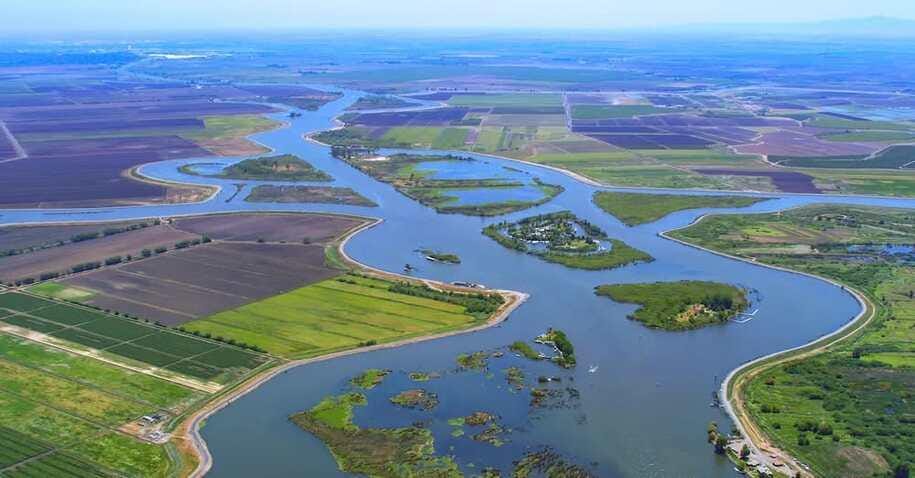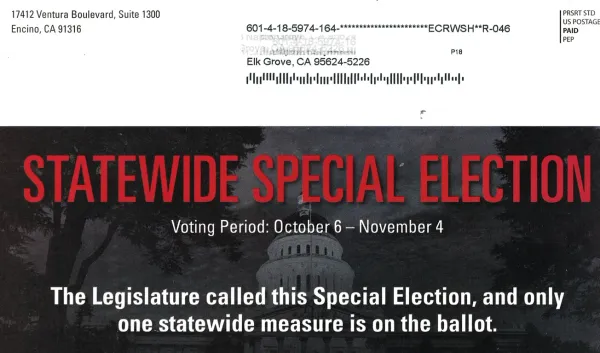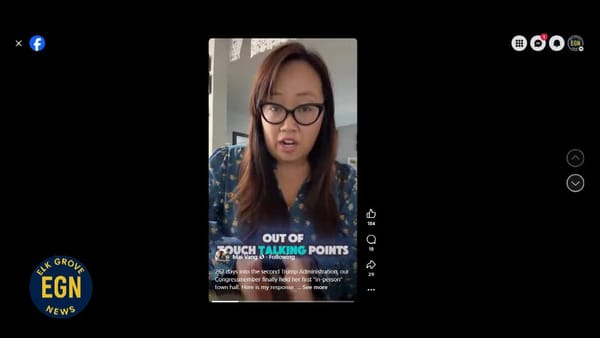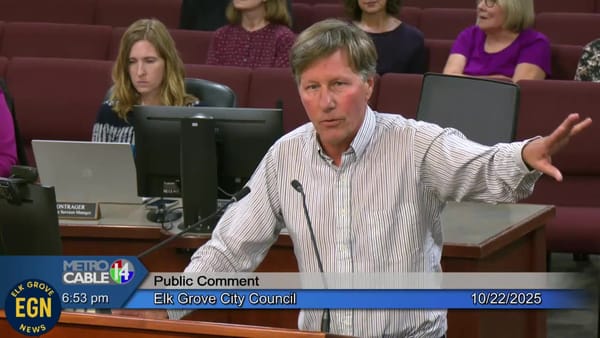Delta Tunnel Update: Governor claims two victories, CalChamber files dangerous initiative
Newsom on October 23 announced what he described as “two recent key victories” in his unrelenting political campaign to advance the 43-mile long Delta Tunnel

Opponents of the Delta Tunnel project last month celebrated their successful campaign against Newsom’s trailer bill to fast-track the Delta Conveyance Project through the State Legislature, but the zombie project continues to slowly move through other government processes.
Newsom on October 23 announced what he described as “two recent key victories” in his unrelenting political campaign to advance the 43-mile long Delta Tunnel. He cited a court decision reversing a preliminary injunction that was previously blocking pre-construction geotechnical work, along with a California Department of Water Resources (DWR) submission to the Delta Stewardship Council for a “certification of consistency” for the broader project.
He claims the project is a critical infrastructure project to “safeguard California’s water supplies amid a hotter, drier future,” while Tribes, fishing groups, environmental justice organizations, family farmers and elected officials say underground tunnel would devastate imperiled salmon and other fish populations and wreak havoc in communities throughout the Bay-Delta region.
Newsom claimed that these “victories help the Delta Conveyance Project move forward in compliance with the Delta Reform Act” — the state law that creates a regulatory framework to protect both the Sacramento-San Joaquin River Delta ecosystem and a reliable statewide water supply.
“California must quickly complete the Delta Conveyance Project to protect our state’s water supplies,” Newsom gushed. “No piece of infrastructure is more fundamental to our water supply and economic success. This is the most effective strategy to ensure that the state can continue to deliver water for Californians in future hotter, drier, and more extreme conditions. Enough delays, we must quickly move forward to protect Californians’ water supplies, and we look forward to completing this project sooner rather than later.”
However, opponents of the project said the tunnel would do anything but protect the Delta ecosystem and the state’s water supply.
“The Governor’s statement ignores more practical ways to secure California’s water supplies without sacrificing the Delta, namely continuing to maintain our existing levee system,” said Osha Meserve, Counsel for numerous Delta interests in administrative and judicial proceedings. “The reference to a hotter drier future is particularly ironic, since the Delta Tunnel proposal actually would fail to perform as promised in that climate scenario. With complex challenges like reduced snowpack and a sinking aqueduct, simplistic yet extremely costly big pipe solutions like the Delta Tunnel are not going to cut it.”
In response to Newsom’s boasting about “two key victories,” Roger Mammon, President of California Striped Bass Association, West Delta Chapter, pointed out, “The Governor can tout about overcoming two hurdles for the DCP, but it still remains the most environmentally destructive project ever imposed on our Delta and will have negative effects on all Californians.”
Carolee Krieger, Executive Director of the California Water Impact Network (C-WIN), said the Governor’s claim of “two key victories” for the Delta Tunnel is just “more of the Governor’s smoke and mirrors to cover up the facts.” She noted that the Delta Tunnel has to still go through many steps before it could be ever approved.
Krieger said the proposed “$100 Billion boondoggle tunnel” still has no approved water rights, no authority to issue bonds, and no permit from the State Water Resources Control Board.
“With no water, no money to build and no permit, it sounds like it isn’t even close,” Krieger stated. “This will harm the ratepayers, the area of origin water rights farmers in the Delta and the fish. It’s time to pull the plug on this money sucking waste!”
Frank Egger, President of the North Coast Rivers Alliance, said the claim that the Delta Tunnel will protect Californians’ water is “totally false.”
“The tunnel creates no new water. It further diverts our Northern California rivers south, first to irrigate Westlands Water Districts high plain desert to grow products to export, not feed America, then to drive new development in the Southland. There are real alternatives to meet So Cal's water needs,” he revealed.
He also noted this the 3rd year of closure for California's commercial salmon season, due to the collapse of Sacramento and Klamath River fall-run Chinook salmon populations.
“Califonia's Chinook Salmon are teetering on extinction and commercial fishers are facing bankruptcies. We ran a Statewide Referendum to stop the Peripheral Canal and we can run a Referendum to stop this proposed $20 billion dollar boondoggle,” he concluded.
Gary Bobker, Program Director of Friends of the River, summed up the essential dilemma posed by the project.
“A project that takes more water from the Delta inherently cannot protect the Delta. This project wastes a million taxpayer dollars each day. The Governor needs to move on,” he concluded.
Mario Galvan, Sacramento Peace Action Board Member, also weighed in on the Governor’s announcement.
”Regarding the current situation, I feel that the Governor is in the grip of corporate cash, like our federal government. I just did a deepseek search on water allocations in CA, and wasn't really too surprised to see that 80% of ‘human use’ of water goes to agribusiness, and around half of that is to export crops, mostly the kind grown by the Resniks and their buddies. Given the enormous wealth of the Resnicks, it seems obvious that a lot of money is riding on the allocation of water,” Galvan noted.
California Chamber files ballot initiative that would eviscerate CEQA
In another development regarding the Delta Tunnel, the California Chamber of Commerce on October 21 filed a request for a ballot initiative titled the “Building an Affordable California” initiative, according to the Chamber’s website.
“The Building an Affordable California initiative would streamline the review of essential projects under the California Environmental Quality Act (CEQA). Rather than provide piecemeal exemptions, it would establish reasonable timelines for local and state agencies to review plans and solicit public comment. Timelines would also be established for any necessary judicial review,” the Chamber wrote.
“The initiative would ensure timely decisions are made on proposed essential projects such as housing, improvements to water supply, transportation, energy, and facilities for health and public safety,” the Chamber stated.
In a press release responding to the Chamber’s announcement, Restore the Delta noted that “essential projects’”are defined so broadly that virtually any public, private, or utility infrastructure project could qualify—paving the way for large-scale construction without the environmental review and community protections CEQA provides.
“This is a direct attack on environmental justice communities, Tribal sovereignty, and the ecosystems that sustain our state,” said Morgen Snyder, Director of Policy and Programs at Restore the Delta. “At a time when California residents are on the verge of losing their SNAP benefits and healthcare, framing this initiative as ‘affordable’ is frankly disrespectful. While housing affordability is a real crisis, removing community voices and environmental safeguards for the sake of industry profits is a massive step in the wrong direction.”
Snyder said the proposal follows “a growing wave of legislative efforts to weaken CEQA in the name of speeding up large infrastructure and housing projects—despite the fact that many of these recent streamlining measures have not yet been implemented or evaluated.” If passed, the new initiative would:
- “Eliminate key community and environmental protections, including shortening the timeframe for public comment, which places an undue burden on impacted communities — often with fewer resources — effectively eliminating or severely limiting their ability to provide input and advocate for mitigation of harms.
- “Undermine AB 52 Tribal consultation requirements, replacing them with vague, limited language that weakens tribal sovereignty and confidentiality.
- “Leave mitigation decisions entirely to the lead agency, giving developers and state departments unchecked authority to define their own environmental accountability.”
Notably, the proposed ballot language defines an “essential water project” as one that repairs, replaces, improves, or augments public water systems — or falls under the state’s Water Resilience Portfolio, according to Snyder. Under this definition, the controversial Delta Conveyance Project would almost certainly qualify as an “essential project,” the group said.
“That designation would effectively shield the Delta Tunnel from meaningful CEQA review — silencing Delta communities and ignoring the project’s massive environmental and economic consequences. The Delta region supports a $780 million recreation and tourism economy, a $1.5 billion commercial fishing economy, and $5 billion in agricultural production — all of which could be undermined by the project’s disruption of Delta flows and ecosystems,” said Snyder.
The group also took issue with Governor Gavin Newsom’s announcement this week celebrating new “wins” for the Delta Conveyance Project, including a court decision allowing preliminary geotechnical work to resume and the Department of Water Resources’ submission of a Certification of Consistency with the Delta Plan.
Restore the Delta cautioned that these developments “are not victories for Californians, but rather signals of a deeper pattern of state leadership prioritizing politically connected water agencies over the Delta’s ecological and economic health.”
“The Governor’s framing of the Delta Tunnel as a climate solution is profoundly misleading,” Snyder added. “It will not create new water, it will only reroute it — deepening harm to Delta communities, Tribal resources, and ecosystems that are already at a breaking point. There will be appeals and debate around whether this project is even consistent with the Delta Reform Act’s coequal goals: protecting the Delta and ensuring reliable statewide water supplies.”
Restore the Delta is calling on California’s elected leaders to reject “backroom attempts to gut environmental review and instead focus on truly sustainable, community-driven solutions for water resilience such as investments in regional self-sufficiency, ecosystem restoration, and equitable access to clean water for all Californians.”
I’ll conclude this piece with a question that I’ve posed to state officials at numerous hearings and meetings regarding the Delta: Can you give me one example in U.S. or world history where a project to divert water out of a river or estuary has restored that river or estuary?
Not one Delta Tunnel project proponent has ever been able to answer that question.
Background: Follow The Big Ag Money
The reason for Newsom’s incessant campaign to fast-track the Delta Tunnel before the end of his second term as Governor becomes crystal clear when you realize that Beverly Hills Billionaires Linda and Stewart Resnick, owners of the Wonderful Company and the largest orchard fruit growers in the world, are among the largest contributors to Governor Newsom and hosted his 2022 anti-recall campaign in a fundraising letter.
The Resnicks have donated a total of $431,600 to Governor Gavin Newsom since 2018, including $250,000 to Stop The Republican Recall Of Governor Newsom and $64,800 to Newsom For California Governor 2022. Not only did the Resnicks donate $250,000 to Stop the Republican Recall in 2022, they hosted a fundraising letter to persuade wealthy potential donors to contribute to the effort.
Newsom received a total of $755,198 in donations from agribusiness in the 2018 election cycle, based on the data from www.followthemoney.org. That figure includes a combined $116,800 from Stewart and Lynda Resnick and $58,400 from E.J. Gallo, combined with $579,998 in the agriculture donations category.
But the Resnicks are also huge contributors to the University of California system and other universities in the state. In 2019 they made a donation of $750 million to Caltech and in 2022 made a $50 million donation to UC Davis, in addition to contributing millions to UCLA, CSU Fresno and other universities over the years.
The Resnicks have pushed for increased water exports from the Delta for agribusiness and the construction of the Delta Tunnel for many years.
The Resnicks have donated many millions of dollars to both the Democratic and Republican parties and to candidates for both parties over the years. They were instrumental in the creation of the Monterey Amendment, a 1994 pact between Department of Water Resources and State Water Project contractors, that allowed them to obtain their 57 percent stake in the Kern Water Bank: https://www.watereducation.org/aquapedia/monterey-amendment




